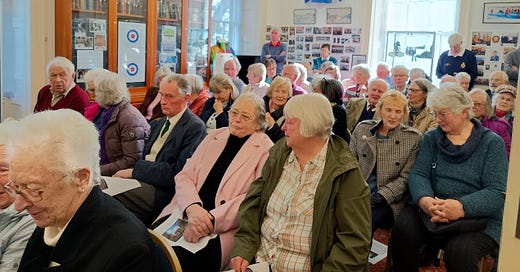New Scottish Ministers
Our new First Minister has finished appointing his ministers and we now have two who are local to us. Emma Roddick, our SNP regional MSP and frequent visitor to the ward, is now Minister for Equalities, Migration and Refugees and the Maree Todd, MSP for Caithness, Sutherland and Ross just across the Moray is now Minister for Social Care, Mental Wellbeing and Sport. Congratulations to them both.
And talking of Emma Roddick she kindly asked a question about the new Nairn Academy at Portfolio Questions at Holyrood last week which I forgot to mention in last weekend’s post.
Nairn Museum
The museum opens its door for a new season tomorrow, Monday 3rd April, and as one of your local councillors I was invited to attend a packed meeting on Saturday of the Friends of the museum to start the season.
The meeting included a talk on Nairn Curling Club. This ties in with the first exhibition of this season Nairn on Ice: A History of Curling in Nairnshire, which runs from now until June.
Nairnshire Area Committee and Ward Business Meetings
Every councillor on Highland Council had an email this week from someone in Nairn who claimed that the publicly visible Nairnshire Area Committee meetings were “simply a rubberstamping forum” and that the real decisions are made at closed ward business meetings so I think it’s worth addressing that so that you all understand how the council works locally.
The decision making body for local councillors, and the only decision making body, is the area committee meeting. Area committees meet every three months on average and consist of members from one or more ward, so for example the City of Inverness Area Committee is a multi-ward committee covering seven wards and having 23 members and is very political, but most area committees are one or two ward and tend to be more collegiate, which is probably a good thing. They are formal meetings so members are called to speak in turn by the chair, and decisions are made with a vote if necessary.
In addition each ward also has ward business meetings. These happen more often. On average once a month but it varies and they are chaired by the ward business manager - so an officer of the council - not a councillor. They are much more informal, so it’s much more like a conversation.
Ward business meetings perform a number of purposes. For example they let officers brief us on decisions that they are authorised by council to take under what are known as “delegated powers”. They do this so that we can give our feedback. A good example of this is the ward discretionary fund. Organisations put in requests for funds and officers decide who gets it but they talk to us first so we can comment, and officers will take our comments into account, but I should stress that they, not we, decide whether the funds are granted.
They’re also a way for organisations and individuals to brief us on their plans, normally where they know that at some point in the process the council will be involved. So, to take a recent example, representatives from Arsersier Port visited us to explain why they were asking the council to un-adopt the road into the port.
But as I said above the area committee is where decisions are made by councillors and the Arsersier Port road un-adoption is a good example which illustrates how this is not a “rubberstamping forum”. As you can see in the agenda papers, the recommendation from officers was that “[The road department] are supportive of the delisting of this road and Members are asked to approve the proposed change.” however we debated this at area committee and, as you’ll see if you watch the meeting, we decided not to approve the change.




